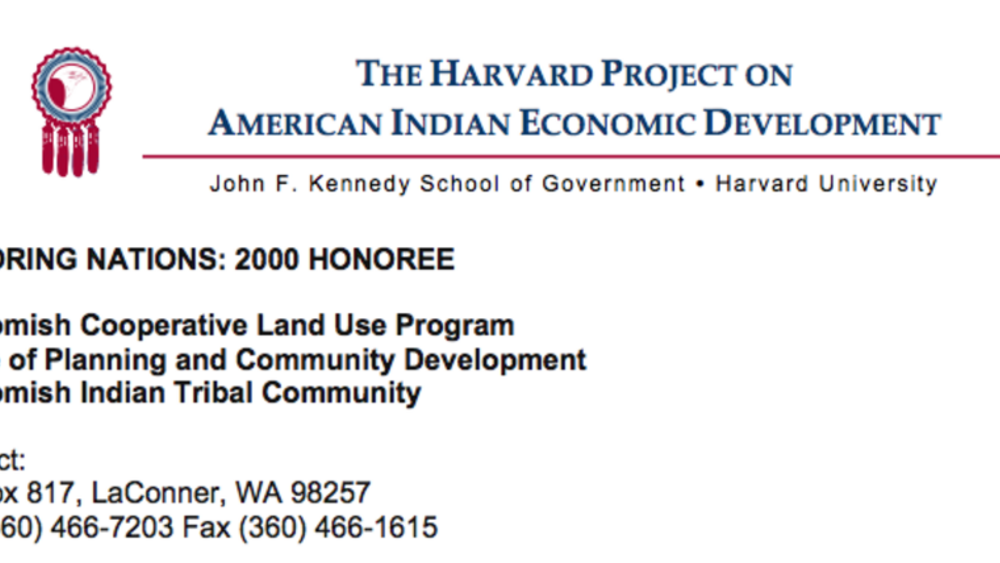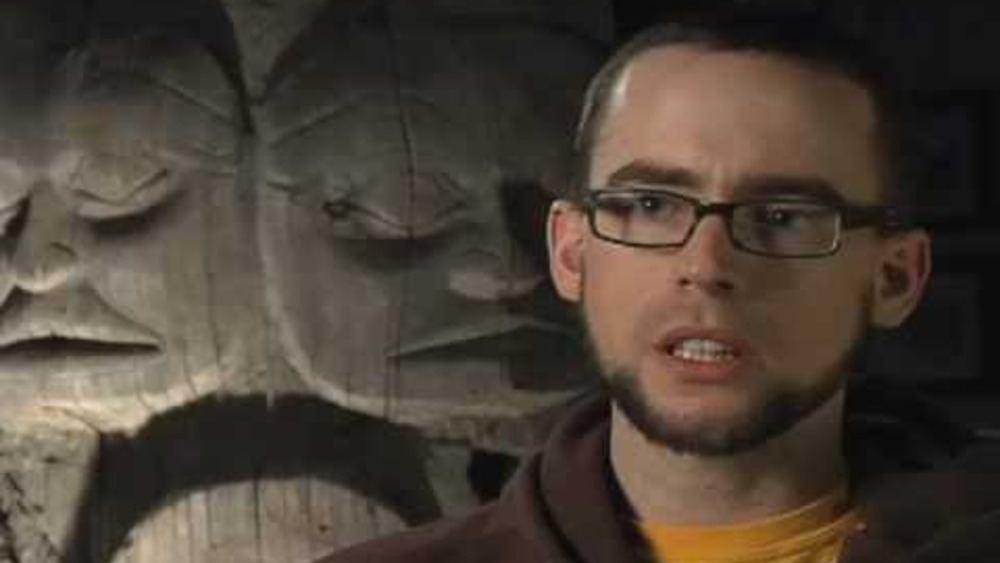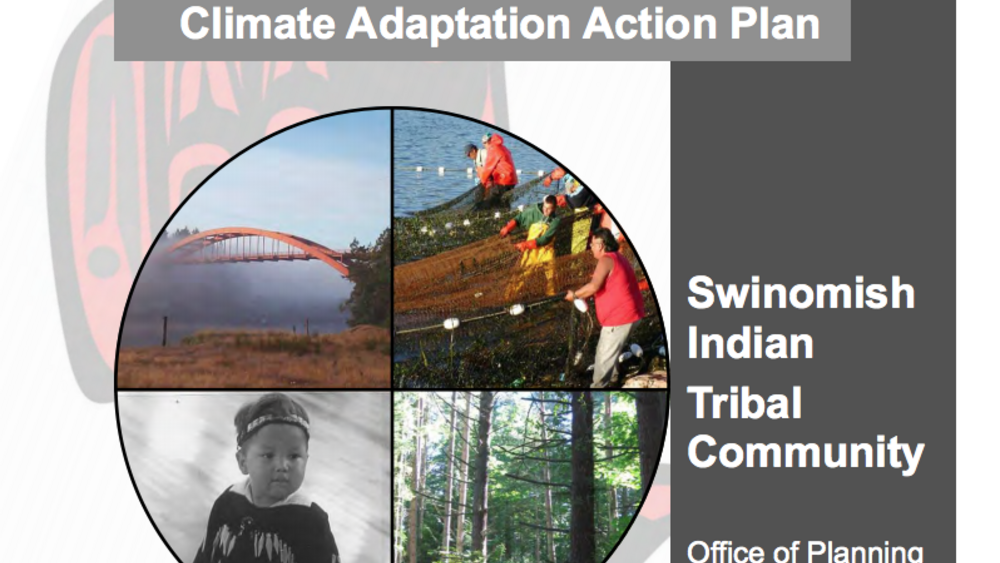Charlie O'Hara discusses the Swinomish Cooperative Land Use Program and the importance of developing productive mutually beneficial government-to-government relations.
Additional Information
O'Hara, Charlie. "Developing Productive Government-to-Government Relations: Swinomish Cooperative Land Use Program." Honoring Nations symposium. Harvard Project on American Indian Economic Development, John F. Kennedy School of Government, Harvard University. Sante Fe, New Mexico. February 7, 2002. Presentation.
Transcript
Andrew Lee:
"Our final presentation from an Honoring Nations winner today is Charlie O'Hara, who's going to be talking about developing productive government-to-government relationships. Charlie's from the Swinomish Tribe in Washington State, which is about 80 miles north of Seattle. And they deal with a problem that many of your nations face as well, which is how to deal with checker-boarded reservations and how that impacts land use planning. In 2000, the Swinomish Tribe won an Honoring Nations award for their cooperative land use program. It's really a model that I know lots of folks around the country have looked to for inspiration in developing good sovereign-to-sovereign relationships on reservations that are highly checker boarded. Charlie, good to see you here. Ready to hear and learn from you today."
Charlie O'Hara:
"You notice Andrew tilts the mic the whole time to accommodate his six -oot height. Thank you very much. I generally don't need a mic that much.
Let me first start off by saying that I'm a recent employee at the Swinomish Indian Tribal Community. And the work that was done to actually gain this award was done by my predecessor, and much of the credit goes to the tribal senate. Fortunately, I have my tribal chairman here, who can correct me when I make some errors in this presentation, but he and his predecessors deserve much of the credit because this was really a process that took place over a long period of time. It was roughly 15 years, I believe, in terms of the tribe's recognition of the issue and that is the land-use regulation in a checkerboarded reservation and how to best deal with that. The tribe took the position that they had land use jurisdiction over all lands on the reservation. Of course the county's position was, ‘No, you only have land use regulation over the trust portions of the reservation.' So there was a disagreement obviously.
There were options. They could have gone to litigation. The tribe and the county instead chose to try to work out through cooperative agreements a mechanism for dealing with this disagreement. Initially there was a period of mutual education where, through extensive meetings, there was actually a building bridges process that took place of some rather intense workshops to mutually educate both the county and the tribal members regarding each other's concerns, each other's issues in how they might seek some way of accommodating those kinds of concerns. Eventually, out of that process there was an agreement reached as to some basic understandings of the different approaches and how they might be bridged. Ultimately, it ended up with a cooperative agreement that talks about sharing responsibilities for dealing with land use regulation on the fee lands within the reservation. The tribe still exercises complete jurisdiction over trust properties, but it shares responsibilities with the county on the fee lands.
So for example, let me give you an example of how that works. If an individual is going to get a clearing and grading permit, for example, he has a choice of either going to the county or to the tribe. We have mutual processes...similar processes and that individual can go to either place. If he comes to the tribe, I have five days to forward that permit application to the county. They then have 15 days to respond and tell me if there's a problem with it. Likewise, if he were to go to the county, I would have that same opportunity. My response...I might have an issue, for example, because of concern over cultural resources in that particular area or other specifically tribal kinds of concerns. But basically, we use the same UPC, we use the same codes in other words, and we share expertise in a variety of areas. That's kind of the guts of the thing. I'd like to kind of talk a little bit if you don't mind about some of the more abstract aspects of government-to-government relations and effective government-to-government relations.
There's basically three types of relationships you can have with the outsiders, the non-Indians, and that seems to be isolation, litigation or adversarial kind of relationship, or some kind of cooperative relationship. All of them have their applications. In other words, some of them have our appropriate but different kinds of situations. Let me give you an example. For example, on certain cultural practices, isolation may be the best approach where a tribe has no interest in sharing a particular, whether it be ceremonies or practices, with non-Indian community. Isolation, in that case, would probably be the best kind of approach. And quite honestly I think that's probably the approach, is that fair to say at Swinomish with the smoke house? No interest in what the county's doing or anything else. It doesn't impact them. Litigation is often, too often probably, a situation where it ends up being the only avenue in order to protect essential tribal rights and so litigation becomes the only method of resolving an issue. The problem with litigation is often that it's very costly both in terms of financial resources as well as staff resources, it's lengthy, and you never know what the outcome is. It's a crapshoot in other words. And one of the other parts of the problem with that kind of an adversarial relationship is it tends to color other issues and you may be litigating only on one issue but all of a sudden you find that negative atmosphere spreads out over other issues that you're trying to deal with and so it gets less than productive in that sense. Cooperative relations, on the other hand, can be productive, but there needs to be in those cases perceived balance of power relations. Too often, you see groups pulled into cooperative or collaborative situations where the power isn't equal and, I would argue, that those are difficult situations for tribes to be in. One situation for example that I particularly don't care for is those kinds of cooperative or collaborative efforts where tribes are viewed as another stakeholder. Often, the situations involve trust responsibilities, treaty rights, other things where tribes are not just another stakeholder. And in those cases it really requires a defined government-to-government relationship and tribes shouldn't be treated as just another stakeholder. So I guess my point is that each of these approaches have their application.
The Swinomish Tribe has a culture of respect for all people and a willingness to try to find a cooperative way of working through issues. It's probably the most respectful group of people I've ever had the privilege to work with and I really enjoy that opportunity. The cooperative relationships can be the most productive however, when that perceived power relationship is balanced. And that can often require a lengthy mutual education process and that's often necessary. And that's the process that the tribe went through with Skagit County so that they could both understand their issues. Often we feel that our issue is the right issue and whoever we're talking with, their issue doesn't have value. Typically for cooperative relationships to work, there needs to be some kind of mutual respect development. Like I said, cooperative relationships can be most productive, because like the adversarial relationship it can spread and it tends to resolve other issues.
I want to allude here for a minute to Jon Cooley's remarks about the cooperative agreement with [U.S.] Fish and Wildlife. In a prior life, I worked with White Mountain Apache Tribe as well, and so I had the opportunity to work on that issue. And just because it's a nice thing to talk about, that statement of, what actually turned out to be a statement of relationship developed out of a meeting between the chairman of the White Mountain Apache Tribe and the director of the U.S. Fish and Wildlife Service; one-on-one in a neutral location with a ground rule that no lawyers were allowed. Interestingly enough, that meeting was brokered by Joe Kalt. Joe Kalt recognized the conflict that the tribe was in with U.S. Fish and Wildlife Service and I happened to be seeing him and he asked me, ‘Do you think Chairman [Ronnie] Lupe would meet with Molly Beattie?' And fortunately Chairman Lupe agreed and it was a most productive meeting. The interesting part of that though was that we had been thoroughly engaged in a conflict situation; we had been spending all of our resources fighting with U.S. Fish and Wildlife Service. When the statement of relationship concluded, all of a sudden the whole thing changed and we were working hand-in-hand in the field, doing things on the ground to improve the situation for endangered species. So it was an interesting experience. But like that experience, it rested on an agreement to disagree. The Chairman emphatically stated that the Endangered Species Act does not apply on Indian lands. Molly Beattie said, ‘I have to...my job is to implement the Endangered Species Act. We don't agree.' They said, ‘Fine, we don't agree, but let's set that aside and see how we can move forward.' Likewise, in the case with the Swinomish Tribe and Skagit County there was an agreement: ‘We don't agree on who has jurisdiction over fee land, but let's set that disagreement aside so we can move forward productively.' Those kinds of mutual respect and agreements to disagree are necessary for cooperative relationships because you're not going to agree on everything.
I guess I'm going to try to close. But currently we're involved right now in both the litigation and the cooperative relationship mode and it's going to be interesting to see how that works out. But the one interesting fact, although it's rather contentious litigation and it has to do with treaty rights and endangered species and natural resource management and the tribe protecting those rights, nonetheless the cooperative agreement regarding land use regulation has stood up and it is still a touchstone that we go back to to demonstrate that on some things we can cooperate and we can proceed in a cooperative manner.
So I guess in conclusion, I guess effective government-to-government relationships require mutual respect, they require some level of technical expertise whether it be on fish and game issues or whether it be in the case of land use planning. In the case of the statement of relationship, U.S. Fish and Wildlife Service recognized that the White Mountain Apache Tribe had really good wildlife biology program and management program. In the case of the Swinomish Tribe, they recognized that they had good land use planning and good policies in effect. Those are kind of important, that technical underpinning of those agreements. Third, there has to be a consistency of policy. In other words, when you reach an agreement, then that agreement has to be maintained. It can't be re-read, redefined for every issue. Fourth, there needs to be open communications. That's one thing that we really need to work on is continuing communication with Skagit County. Often, if you don't have an issue, you don't communicate. And then when you have a negative issue the communications can really go sour quickly. Finally, for any of these things to work there has to be political will. If you don't have the will of the senate or in our case the tribal senate or in most cases tribal councils, these things won't stand up. And really, when we talk about what does it take for exemplary governance, it takes a lot of political will on the part of the elected leadership of tribes. Thank you."
Joseph P. Kalt:
"Charlie, as you know, the purpose of the Honoring Nations program is to provide a mechanism by which tribes can learn from each other. And as you know, the Swinomish example is now being used explicitly. I was at Nez Perce just 10 days ago and trying to provide examples to other situations in other tribes to learn from your successes. I have two questions about this; basically it's one question. Is it working? Specifically, two parts to this: one of the things that's been done so much at Swinomish is something that we see nations around the world doing when they don't share a government. That is they both think they're sovereign, they both assert their sovereignty. You all have used these techniques of ‘You have .3 members, I have .3 members and we'll pick a neutral' and that's actually very common in governments around the world is the sign of the exercise of sovereignty. I'd like to know whether that specific mechanism, how it works and then secondly I'd like to know more generally, are these cooperative agreements working? Let me tell you why. When I talk to you or I talk to Ned, one version is, ‘Wow, man it's nothing but trouble. We're negotiating all the time.' And I don't know whether to interpret that as they aren't working or is it like me complaining, ‘My university doesn't work, this thing called Harvard...it doesn't work at all because I'm fighting with my dean.' Well, of course it works at one level. So in other words, does it work? And when I hear you say it doesn't work, does that mean it's not working [unintelligible]?
Charlie O'Hara:
"Let me answer the first one first, which is, ‘Does that mechanism set-up of the advisory group work?' We haven't had an issue of enough significance to call it into being. Quite honestly, that's a shortcoming and I'll take blame for that because we really should be working that group in the event that we do have a big issue. We're likely to have one fairly soon."
Brian Cladoosby:
"Let me add just a little bit. I'm Brian Cladoosby. I'm the chairman at Swinomish. Now, this board is set up: if I as a fee-land owner give a permit, bring it to the county, the county sends it to Swinomish and Swinomish says, ‘No, that goes all against everything that we want to do at Swinomish,' then it goes to the deal board. The deal board hasn't had to hear any of these...Swinomish hasn't denied, county hasn't denied. So basically the board...everything that we do is so unified as far as land use that this board hasn't had to have been used in the couple years since it's been set up. So, in a sense, they're there in case we appeal within the county issues or the county appeals to things that we issue. So the board is there, but we haven't had to use it."
Charlie O'Hara:
"And in answer to the second part of that question is, I guess it depends on what day you ask me because sometimes you're optimistic and sometimes you're not. Right now, for example, the tribe...it's what's called the buffer case, meaning that the tribes have been pushing farmers in Skagit County to create bigger buffers on streams to protect salmon habitat. That, of course, cuts into the farmland so you've got farmers up in arms and they tend to be the political power brokers in Skagit County. And so it's very contentious. The tribes have gone to court; the tribes have won consistently in court. The county has tried to get the tribes to back off that position and used a number of mechanisms, intimidation in holding up fee-to-trust applications and a number of other arm-twisting mechanisms. But, surprisingly, it has not affected the land-use agreement and we've had a couple of issues arise, particularly one most recently involving cultural resources or the potential of cultural resources being on a piece of property that was being developed. And the landowner, being a particularly contentious person that claimed he had a cultural survey done, and there was nothing there. So the tribe said, ‘Fine. Show it to us.' He refused. The county then said, ‘Look, if you don't show us this survey, we're not going to go forward.' And so he reluctantly turned it over to the county. He wouldn't turn it over to the tribe. The county then turned it over to us and everything worked out okay. But the point was that it was tested and it worked. And so I guess I'm feeling optimistic today so yeah."
Audience member:
"Let's turn the question around another way. One supposes that good relations between potentially conflicting groups need to be constantly renewed. So are you actively thinking about ways to show as you're doing just today that it's working and celebrating the cooperation that exists against the day when you may have a conflict and you'll need to draw upon the reserve of good will that you're hoping to build up."
Charlie O'Hara:
"Probably not enough to be quite honest with you. But, for example, we've shared like breakfasts with the Skagit County permitting people and brought our cultural resources planner there to explain cultural resource issues and how they can be better sensitive to when they may run into cultural issue resource issues when they're doing projects. We've participated jointly in some conferences but it's never enough. It's something that has to be continually worked."



